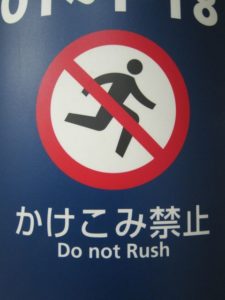 From a gift of jet lag, I’ve been up early the last few days and have enjoyed long walks around Ginza, here in Tokyo. I love watching this huge city waking up. Since the tsunami, Japan’s economy is slowly recovering. As in many places in the world in this “hopefully post-recessionary” period, it’s a challenge. Particularly in light of their long rollercoaster of prosperity and challenge in the last decades, the current slow economy is weighing on people.
From a gift of jet lag, I’ve been up early the last few days and have enjoyed long walks around Ginza, here in Tokyo. I love watching this huge city waking up. Since the tsunami, Japan’s economy is slowly recovering. As in many places in the world in this “hopefully post-recessionary” period, it’s a challenge. Particularly in light of their long rollercoaster of prosperity and challenge in the last decades, the current slow economy is weighing on people.
The complexities of global economic recovery are far beyond my scope, but what I know is that ultimately the fuel for all enterprise is human spirit. And on my walks, I’ve seen many signs that tell me Japan is on track.
While there are certainly many very serious ways of analyzing the human side of economies, what I’m observing are “small” interactions that signal something deep and important about the future.
People greet strangers in the elevator.
It’s not everyone, but often strangers say hello, “O-hayo goziamasu” and bow. In many big cities, there is a destructive level of dehumanization, people don’t see one another. Here these small moments of greeting signify a deep cultural value for shared humanity. When people remember that we’re all in the lifeboat together, that interdependence creates support and strength.
The workers in the garden perform calisthenics together.
In crisis, we tend to become totally task focused, totally results driven. The heroic call to arms has value, but it’s not a sustainable. These small rituals of “warming up” show a culture where the process is valued along with the product. Yes, we need results, but economic success is a marathon, not a sprint.
People laugh at little.
Two people talk at once, or step into an elevator together, and they laugh – even giggle. While Japanese business people tend to appear extremely serious (dressed in the ubiquitous black suit and somewhat stoic expression), joy is just around the corner. People here have a ready smile, and this sparkle generates connection and energy.
Children are cherished.
There are not a huge number of babies here, but when you see one, it’s also easy to see the joy and regard young children are given. People stop and smile and wave — and seem genuinely grateful for each new life. This represents a fundamental optimism and valuing of the future, which is the catalyst for all change.
Lights are dimmed.
Over a year after the tsunami, here in this huge city, there are many lights and escalators left off, and aircon is set to a more modest temperature. People are willing to sacrifice their person comfort for the greater good. In the end, change requires not just good intention, but commitment. It is work to make a better future.
It’s a fascinating place, and these is so much to say — but I hope these observations serve to spark your thoughts about signs of human spirit in the economy wherever you are walking.


